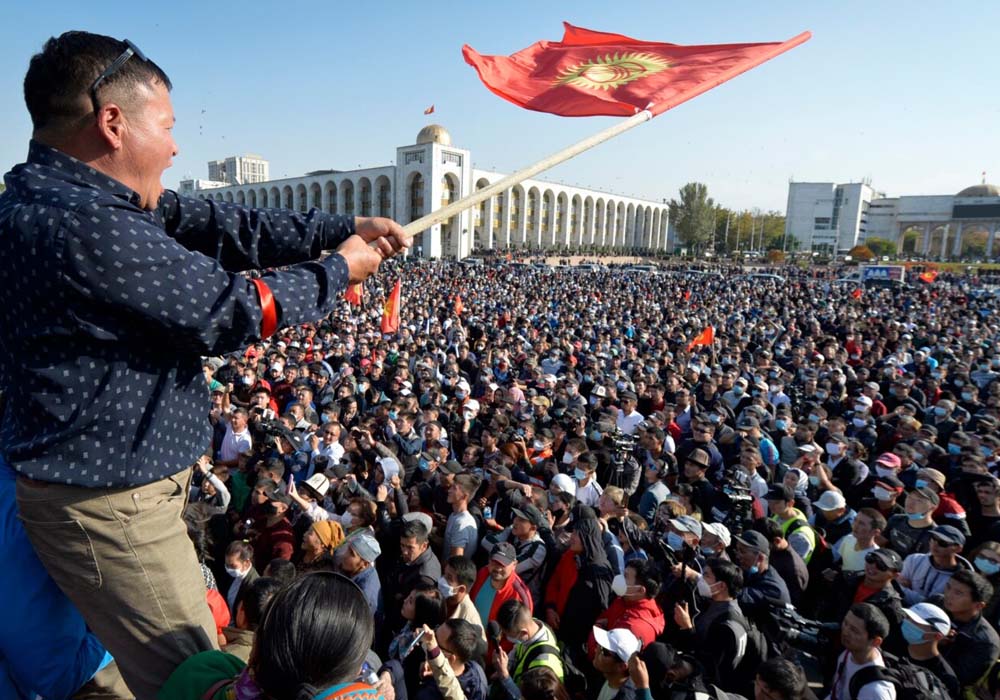Russia and China rejecting the proposed "Summit for Democracy" led by the United States made it to the regional news headlines this week, while one of the most significant events in the region was the parliamentary elections in Kyrgyzstan on November 28. Also, the forum "Republic of Korea - Central Asia" was held in Dushanbe. In addition, energy security of the region was also in the news, as during the Second Eurasian Congress Tajikistan was offered to return to the Central Asian energy ring in order to establish an exchange of electricity. With regards to Afghanistan, Uzbekistan and Tajikistan made it clear that they will have no room for Afghan refugees in their respective countries.

Image source: RFE/RL
Russia and China rejected the proposed "Summit for Democracy" under the auspices of the United States, which will be held December 9-10 at the initiative of the United States (See: Global Times, TASS). 110 countries received an invitation to the event, without Kazakhstan, Kyrgyzstan, Tajikistan, Turkmenistan, Uzbekistan, Russia, and China on the list. Biden’s “guest list” also became a matter of controversy in other parts of the world, including the Asia-Pacific region (See: The Diplomat)
On November 28, the parliamentary elections were held in Kyrgyzstan (Cabar, Aljazeera). About 2.5 thousand polling stations in Kyrgyzstan and another 59 polling stations abroad, including in Russia, were opened for voting in the elections. The three parties that won the most votes in the elections are exclusively pro-government ones. According to forecasts, they will receive at least 36 of the 54 seats on party lists. These include "Ata-Jourt Kyrgyzstan" (16.6 percent), "Ishenim" (13.3 percent), "Yntymak" (10.59 percent). The religiously oriented Yyman Nuru party, which is also considered pro-government, received 5.2 percent and was the sixth and last party to pass into the parliament. Several opposition parties - Ata Meken, Azattyk, Social Democratic, and Uluttar Birimdigi - held a press conference in Bishkek after the announcement of Kyrgyzstan’s preliminary voting results, stating that they did not recognize the results because of a 40-minute failure of the Central Election Commission's automated vote-counting system. The turnout in these parliamentary elections was the lowest in the electoral history of Kyrgyzstan: only 32.25 percent of the people eligible to vote showed up at the polls. This is a significant decrease compared to the 58.89 percent turnout for the last failed parliamentary elections, held in October 2020.
The Central Asian States remain closed to refugees and asylum-seekers from Afghanistan and do not intend to deviate from their rigid policies (See: The Diplomat,Vestnik Kavkaza). European countries are also in no hurry to accept refugees but are ready to provide financial assistance to Central Asian states to accommodate migrants on their territory. So far, this proposal has not interested anyone. Uzbekistan had not accepted a single Afghan refugee, but in the meantime, Tajikistan had registered 7.5 thousand refugees from the beginning of 2021 until August, when international flights from Afghanistan had been suspended. However, Dushanbe not only stopped accepting new applicants but also began to deport Afghan refugees whose asylum-seeking applications are still pending a response.
On November 30, the 13th Korea-Central Asia Cooperation Forum was held in Dushanbe (See: Business Turkmenistan, AKIpress). The event was attended by about a hundred experts and representatives of the parties, including Foreign Ministers of Kazakhstan Chung Yi-yon, Tajikistan Sirojiddin Mukhriddin, Kyrgyzstan Ruslan Kazakbayev, Turkmenistan Rashid Meredov, Uzbekistan Abdulaziz Kamilov, and Deputy Minister of Foreign Affairs of Kazakhstan Marat Syzdykov. The main agenda of the forum is the interaction of the Republic of Korea and the countries of Central Asia in issues of economic recovery in the post-pandemic period. Participants discussed plans to strengthen cooperation in the four areas of forestry, energy, digitalization, and healthcare. The Republic of Korea and the countries of Central Asia have made notable progress in relations over the past 30 years and are now facing common challenges in the form of climate change and the coronavirus pandemic. The next session of the forum will be held in Seoul in 2022.
Tajikistan will return to the unified energy system of Central Asia next year (See: Global Energy, Sputnik). After the launch of the Rogun hydroelectric station, it will be possible to radically change the energy market of the region and eliminate the shortage of electricity in Central Asia. Currently, the energy system of CA includes Kazakhstan, Uzbekistan, and Kyrgyzstan. Currently, there is still no single regional authority regulating energy affairs in Central Asia and the interests of the individual states in the energy sector remain often mutually exclusive.

